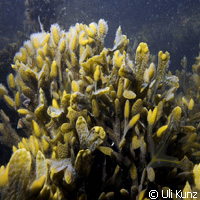Ecosystems and climate-change activity
An international team of scientists led by the Leibniz Institute of Marine Sciences (IFM-GEOMAR) in Germany has discovered that the impact of climate change gets a big boost from highly complex interactions in ecosystems within a relatively short period of time. The results of this study, published in the journal Advances in Marine Biology, will help piece together the puzzle of how inhabitants of the sea fight changes to our planet. Coastal areas put pressure on many plants and animals, forcing both groups to become strong and deal with varying changes. A case in point is the Baltic Sea, a shallow body of water with special geographical, climatological and oceanographic characteristics. Here, the sea's inhabitants cope with many changes including fluctuating temperatures, short-term pH value and variable salinity. 'In a few weeks, these natural fluctuations can exceed the average shifts that are predicted for the next century due to (global) climate change,' says Martin Wahl, a professor of marine biology at the IFM-GEOMAR and lead author of the study. Professor Wahl and colleagues point out that global change plays a pivotal role in coastal ecosystems. 'Even the smallest variations in an ecosystem can have major consequences due to ecological intensification,' Professor Wahl says. 'On the other hand, stressors can even buffer each other in certain cases.' The team, from Finland, Germany, the Netherlands, Portugal, Sweden and the United States, says that abiotic stresses (e.g. warming) and biotic stresses (e.g. parasites and herbivores) interact with support from the stress ecology of macroalgae. For instance, the seaweed Fucus vesiculosus is a macroalgae. Popularly referred to as bladderwrack, this macroalgae is found along the coasts of the Baltic and North Seas, as well as the Atlantic and Pacific Oceans. 'There it plays a key role in the ecosystems of shallow waters,' Professor Wahl says. 'Even though the seaweed of the Baltic Sea should be accustomed to difficult (harsh) living conditions, its populations have diminished considerably in the last decades. Actually, Fucus vesiculosus can live in depths of up to six metres. However, we find it now only in depths of up to two metres at the Western Baltic Sea.' While global change impacts this shift, the researchers collated all data derived from past studies on the bladderwrack to shed new light on this puzzle. The data consisted of information about light availability and nutrients, defence strategies, the genetic variety of algae populations and reactions to environmental pollution, among others. 'Thus we've been able to show a cascade of effects and interactions, which influence single algae or whole populations,' Professor Wahl says. For instance, shading weakens energy reserves, which results in weakened antifouling and anti-grazing defences. These in turn intensify fouling and grazing pressure. The researchers point out that the photosynthetic area of the thallus is decreased, thus increasing the shortage of energy under low light conditions. Low light and temperature stress diminish growth, effectively threatening the alga's ability to compensate for tissue loss to grazers. 'The list of possible intensifications is long and complex,' Professor Wahl says. Researchers are now modelling the stress ecology of macroalgae in order to provide insight to this problem. On the whole, the team's findings serve as an illustration for what goes on with ecosystems in coastal areas and shelf areas. 'Hardly any species will perish because of a single effect of climate change, but we can't ignore it either.' This study could help intensify research in the future. Professor Wahl points out that there is insufficient information about 'the snowball effect which ecological intensification can cause'.For more information, please visit:IFM-GEOMAR:http://www.ifm-geomar.de/index.php?id=1&L=1Advances in Marine Biology:http://www.elsevier.com/wps/find/bookdescription.cws_home/703763/description#description
Countries
Germany, Finland, Netherlands, Portugal, Sweden, United States



